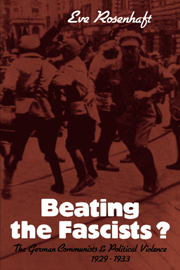Book contents
- Frontmatter
- Contents
- Preface
- List of abbreviations
- Map 1 Greater Berlin 1930
- Map 2 Central Berlin 1930
- 1 Introduction: Social crisis, radical politics and organized violence in Weimar Germany
- 2 The Party, the neighbourhood and the uses of violence in the ‘Third Period’
- 3 Defining the enemy: The wehrhafter Kampf against the SA in theory and propaganda
- 4 Organizing the wehrhafter Kampf: The Communist defence formations
- 5 Between ‘individual terror’ and ‘mass terror’: The campaign against the SA-taverns, 1931
- 6 The shape of violence in the neighbourhoods
- 7 Who were the streetfighters?
- 8 Conclusion: Communist politics in the Weimar Republic
- A note on sources
- Notes
- Bibliography
- Index
1 - Introduction: Social crisis, radical politics and organized violence in Weimar Germany
Published online by Cambridge University Press: 05 March 2012
- Frontmatter
- Contents
- Preface
- List of abbreviations
- Map 1 Greater Berlin 1930
- Map 2 Central Berlin 1930
- 1 Introduction: Social crisis, radical politics and organized violence in Weimar Germany
- 2 The Party, the neighbourhood and the uses of violence in the ‘Third Period’
- 3 Defining the enemy: The wehrhafter Kampf against the SA in theory and propaganda
- 4 Organizing the wehrhafter Kampf: The Communist defence formations
- 5 Between ‘individual terror’ and ‘mass terror’: The campaign against the SA-taverns, 1931
- 6 The shape of violence in the neighbourhoods
- 7 Who were the streetfighters?
- 8 Conclusion: Communist politics in the Weimar Republic
- A note on sources
- Notes
- Bibliography
- Index
Summary
If it were possible to judge the character of a political order from the immediate circumstances of its birth and death, the Weimar Republic would have to be regarded as a remarkably, indeed painfully peaceable one. The new order was called into being by the simple act of PhilippScheidemann, leader of the Social Democratic Party (SPD), who stepped out onto a balcony outside the dining-room of the Reichstag building on 9 November 1918 and proclaimed the ‘democratic republic’. With Germany near collapse at the end of an exhausting war, her armed forces in a state of mutiny and her monarchy on the verge of abdication, Scheidemann stepped into a power vacuum which, for the moment, made it possible for him and his colleagues to form a provisional government and proceed to the consolidation of the Republic. Similarly, the Republic's demise was signalled by a series of political events, mostly within the broad bounds of constitutionality, bloodless in themselves and evoking no significant violent reaction. These culminated in Hitler's appointment to the Chancellorship in January 1933 and six weeks later the passage by the Reichstag, against the votes of the Social Democrats, of the Enabling Act which effectively gave Hitler dictatorial powers.
In fact, violence of all kinds, both large-scale and individual, was endemic to political life in the Weimar Republic. It was an expression of deep-running and unresolved social conflicts, and the obstinate pacifism of the men and women who had called the Republic into being and remained its defenders in the final crisis arose in part out of their consciousness of that fact.
- Type
- Chapter
- Information
- Beating the Fascists?The German Communists and Political Violence 1929–1933, pp. 1 - 27Publisher: Cambridge University PressPrint publication year: 1983



